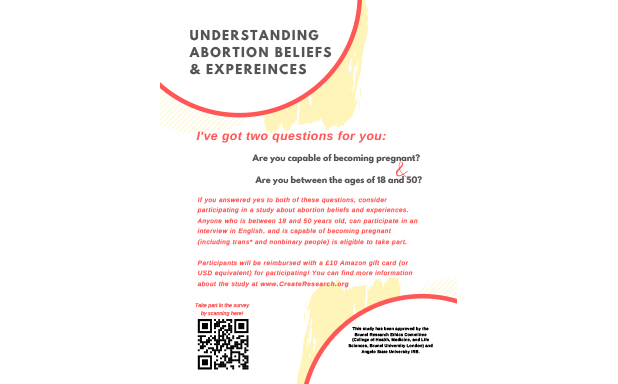Women are asked to share their experiences and beliefs about abortion in a timely new study by Brunel University London.
The team will compare these women’s experiences with those of 40 similar women living in the USA.
The study follows a recent slew of anti-abortion laws across the USA. A Texas high school student earlier this summer criticised the state’s ‘dehumanising’ abortion ban in a graduation speech seen by millions on social media which won praise from Hillary Clinton.
Texas’s extreme new ‘heartbeat’ measure to start in September blocks the procedure after six weeks with no exceptions for rape or incest.
“While still legal, abortion will be functionally outlawed in Texas, as well as other states like Arkansas and Oklahoma,” said evolutionary psychologist Dr Lora Adair. “In Texas, for example, the combination of relatively few abortion clinics and the new laws banning abortion after the detection of a heartbeat means that pregnant people face many hurdles in accessing the care they need.
“We want to hear from women, trans and non-binary people living in these two very different places where state and government support for reproductive freedom is so wildly different.”
Forty UK people aged between 18 and 50 are offered £10 to share their experiences in an individual, anonymised 45-minute Zoom meeting. The team want to hear from people who have and haven’t had an abortion and are capable of becoming pregnant.
The study will throw a magnifying glass on several aspects of the experience in a way not done before.
They’re interested in:
- The time frame and whether there was an uncomfortable or unwanted time lag between choosing abortion and being able to get access to services
- What kind of support people had to decide and how they found social support
- What ways people didn’t feel supported or felt stigmatised by people in their social network
- The positive and negative aspects of people’s abortion experience, plus beliefs about what an abortion might be like
In both countries, people affected by poverty face a longer delay between deciding on and scheduling the procedure, researchers suspect. Things like access to information, community norms about sex, and the physical and practical resources needed to find a provider and get to one, may play a part in that.
“It is 2021, and there is still very much a bias in communication about abortion, which often emphasises negative or harmful experiences,” said Dr Adair.
“We want to build a broader, more accurate picture of people’s experiences of support and stigma and find out how accessible they feel that abortion is to them. If they wanted one, did they feel like their family and friends would support them? Would they feel safe and in control of the process?
“We’re not just interested in what went wrong or what people wished had gone differently. We want to hear about empowering and affirming abortion decisions.”
Take part here. For more, email thecreateresearchlab@gmail.com
